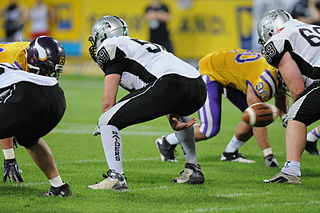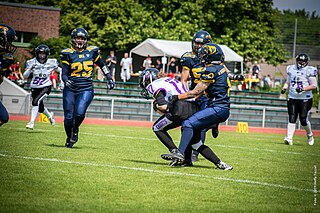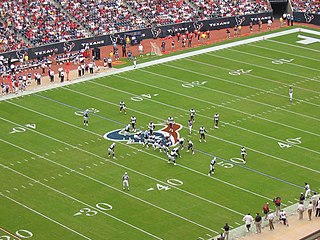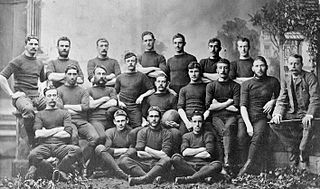Related Research Articles

Canadian football is a sport played in Canada in which two teams of 12 players each compete for territorial control of a field of play 110 yards (101 m) long and 65 yards (59 m) wide attempting to advance a pointed oval-shaped ball into the opposing team's scoring area.

A snap is the backward passing of the ball in gridiron football at the start of play from scrimmage.

Norwich City Football Club is an English professional football club based in Norwich, Norfolk. They will compete in the EFL Championship in the 2022–23 season following their relegation from the Premier League in the 2021–22 season. The club was founded in 1902. Since 1935, Norwich have played their home games at Carrow Road and have a long-standing and fierce rivalry with East Anglian rivals Ipswich Town, with whom they have contested the East Anglian derby 134 times since 1902.

Touch football is an amateur variant of American football and Canadian football in which the basic rules are similar to those of the mainstream game, but instead of tackling players to the ground, the person carrying the ball need only be touched by a member of the opposite team to end a down. It is similar to street football, another amateur variant, however in street football full contact is allowed.

A football chant or terrace chant is form of vocalisation performed by supporters of association football, typically during football matches. Football chanting is an expression of collective identity, most often used by fans to express their pride in the team or encourage the home team, and they may be sung to celebrate a particular player or manager. Fans may also use football chants to slight the opposition, and many fans sing songs about their club rivals, even when they are not playing them. Sometimes the chants are spontaneous reactions to events on the pitch.

Gridiron football, also known as North American football or, in North America, simply football, is a family of football team sports primarily played in the United States and Canada. American football, which uses 11-player teams, is the form played in the United States and the best known form of gridiron football worldwide, while Canadian football, featuring 12-player teams, predominates in Canada. Other derivative varieties include arena football, football for smaller teams, flag football and amateur games such as touch and street football. Football is played at professional, collegiate, high school, semi-professional, and amateur levels.

American and Canadian football are gridiron codes of football that are very similar; both have their origins in rugby football, but some key differences exist.
Strategy forms a major part of American football. Both teams plan many aspects of their plays (offense) and response to plays (defense), such as what formations they take, who they put on the field, and the roles and instructions each player are given. Throughout a game, each team adapts to the other's apparent strengths and weaknesses, trying various approaches to outmaneuver or overpower their opponent in order to win the game.

Gameplay in American football consists of a series of downs, individual plays of short duration, outside of which the ball is dead or not in play. These can be plays from scrimmage – passes, runs, punts, or field goal attempts – or free kicks such as kickoffs and fair catch kicks. Substitutions can be made between downs, which allows for a great deal of specialization as coaches choose the players best suited for each particular situation. During a play, each team should have no more than 11 players on the field, and each of them has specific tasks assigned for that specific play.

Cheering involves the uttering or making of sounds and may be used to encourage, excite to action, indicate approval or welcome.

"Billy Boys", also titled "The Billy Boys", is a loyalist song from Glasgow, sung to the tune of "Marching Through Georgia." It originated in the 1920s as the signature song of one of the Glasgow razor gangs led by Billy Fullerton and later became viewed to reflect the long-running sectarian religious hatred directed by some Protestants against Catholics in the city. It is associated in particular with Rangers F.C.
A trick play, also known as a gadget play, gimmick play or trickeration, is a play in gridiron football that uses deception and unorthodox tactics to fool the opposing team. A trick play is often risky, offering the potential for a large gain or a touchdown if it is successful, but with the chance of a significant loss of yards or a turnover if not. Trick plays are rarely used not only because of the riskiness, but also to maintain the element of surprise for when they are used.
The old hymn and jazz tune "When the Saints Go Marching In" is used by a number of teams in various sports. It may be used as the team's theme song or reserved for when they scored. Liverpool fans used it as a football chant to honour their player Ian St John in the 1960s, a song that was also adopted by other clubs. Southampton Football Club, for example, use it as a football chant due to the fact that their nickname is The Saints, other football clubs use different variations of the song. It may be used with the standard lyrics, specialized lyrics, or no lyrics at all. When sung by a crowd, it is often started at a very slow tempo, around 70 beats per minute. The next verse is then dramatically sped up to somewhere around 140 beats per minute.
A comparison between American football and rugby league is possible because of their shared origins and similar game concepts. Rugby league is arguably the most similar sport to American football after Canadian football: both sports involve the concept of a limited number of downs/tackles and scoring touchdowns/tries takes clear precedence over goal-kicking.
David Wedderburn was a writer, and schoolmaster at Aberdeen Grammar School. Though his date of birth is not known, he was baptised on 2 January 1580, and was educated in Aberdeen.
The following terms are used in American football, both conventional and indoor. Some of these terms are also in use in Canadian football; for a list of terms unique to that code, see Glossary of Canadian football.

The first New Zealand team was selected in 1884, for a tour to New South Wales, Australia. It was a privately organized selection as the New Zealand Rugby Union was founded not until eight years later. On 22 May 1884, before the tour start, the team played a test match against the Wellington Rugby Football Union team, winning 9 to 0. During the tour, the team recorded eight wins in eight matches in Australia.

The 1938 Victorian Football Association season was the 60th season of the Australian rules football competition. The premiership was won by the Brunswick Football Club, after it defeated Brighton by 33 points in the Grand Final on 20 August. It was the club's third VFA premiership, and the last top division premiership it ever won.

The 1889 SAFA Grand Final was an Australian rules football game contested between the Norwood and Port Adelaide, held at the Adelaide Oval on the 5 October 1889. The match is recognised as "the first ever grand final in Australian football". The game resulted in a victory for Norwood, who beat Port Adelaide by two goals, marking the club's ninth premiership and third in a row.
References
- ↑ Club history Archived 2017-04-20 at the Wayback Machine Norwich City FC
- 1 2 3 Eastwood, John; Mike Davage (1986). Canary Citizens. Almeida Books. p. 24. ISBN 0-7117-2020-7.
- ↑ Irwin, Colin (2006). Sing When You're Winning. Andre Deutsch. p. 202. ISBN 978-0233001845.
- ↑ Doyle, Paul; Glendenning, Barry (6 May 2016). "The Joy of Six: football chants". The Guardian.